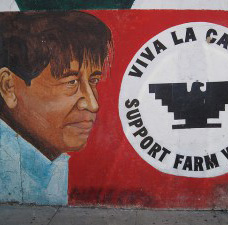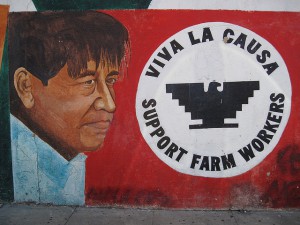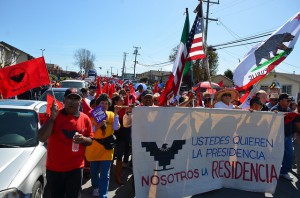The People Who Don’t Go to Law School, Part 3: Growing the Farm Workers’ Movement

How do you create the country’s most historically successful farm workers union? A quick study of Cesar Chavez and the United Farm Workers of America turns up a couple essential tools – bullhorns and an in-house legal team.
 Cesar Chavez helped catalyze one of the most successful non-violent social movements in US history, winning civil rights for farm workers and challenging the political power of industrial agriculture. Through a highly sophisticated strategy of union organizing, farm worker strikes, consumer boycotts, and impact litigation, he built the largest and most successful farm workers union in the country. What is perhaps less well know is the integral role of lawyers and the law in growing the farm workers’ movement.
Cesar Chavez helped catalyze one of the most successful non-violent social movements in US history, winning civil rights for farm workers and challenging the political power of industrial agriculture. Through a highly sophisticated strategy of union organizing, farm worker strikes, consumer boycotts, and impact litigation, he built the largest and most successful farm workers union in the country. What is perhaps less well know is the integral role of lawyers and the law in growing the farm workers’ movement.
In a compelling and comprehensive study of the UFW’s legal strategy in the 60s and 70s, Jennifer Gordon uncovers some significant insights into the role of lawyers in building social movements (Gordon, Jennifer. “Law, Lawyers, and Labor: The United Farm Workers’ Legal Strategy in the 1960s and 1970s and the Role of Law in Union Organizing Today,” U. Pa. Journal of Labor and Employment Law. Vol 8:1). One of the key insights is the impact of power dynamics between lawyers and organizers within social movements: by growing an in-house legal team embedded in the organizing culture of the UFW, the farm workers’ movement was able to successfully avoid “lawyer domination” – a pattern that has derailed other social movements as power shifts away from the grassroots. The UFW’s legal team played an essential role in the overall UFW strategy, but they were never the leaders of the movement [that was always clearly Chavez and others like Dolores Huerta]. Lawyers were held as equals within the movement, and thus never unintentionally disempowered or overshadowed the farm workers themselves as the central force in building the political and economic power of the UFW. These “movement attorneys” hung out in the fields, attended strikes, and understood the role that lawyering played in the organization – to serve the farm workers and advance the movement.
Could there be a more fitting context in which to train attorneys from within a community via a legal apprenticeship?
Chavez recognized this. In the early 1980s, when the UFW’s early legal strategy began to change in response to the changing labor law landscape, Chavez ordered the creation of a UFW legal apprenticeship program. Self-educated himself, Chavez saw an opportunity to cultivate a new generation of attorneys that deeply understood and represented the very community of farm workers they served, and could advance a new approach to labor law based on the experience of working within the farm workers’ movement.
According to Mary Mecartney, a UFW attorney and former apprentice who passed the bar in 1993, “the six alumnae of the UFW apprenticeship program have contributed over 100 collective years of experience as attorneys working with the non-profit sector.“ Mecartney is currently supervising two legal apprentices, both the children of farm workers with passions for social justice and a desire to use the law as a tool for progressive social change. Tom Dalzell, the first UFW paralegal to become an attorney via apprenticeship in 1976, has gone on to become a noted author and union leader. Two other early and successful legal apprentices, Marcos Camacho and Barbara Macri, helped design the UFW apprenticeship program.
In a 2004 profile of UFW legal apprentices in the La Times, Camacho said, “I would do it all over again. I think it really gives you a whole different approach to law, a practical approach that really serves our clients.” He also noted that, at the time, UFW’s program had a 100% success rate for first-time bar exam takers — “better even than Harvard.”
 As the UFW’s history demonstrates, combining grassroots organizing with a sophisticated legal strategy requires a unique approach to lawyering and a team of lawyers that embody the culture of the movement itself. The apprentice path offers several advantages over law school in this context: lawyers will not be saddled with debt that limits their ability to work for social movement organizations; their training will be deeply infused with the needs and unique experiences of the communities they are serving; and they will be allies to their fellow organizers, rather than held up as experts in ways that have diffused the collective power of other social movements.
As the UFW’s history demonstrates, combining grassroots organizing with a sophisticated legal strategy requires a unique approach to lawyering and a team of lawyers that embody the culture of the movement itself. The apprentice path offers several advantages over law school in this context: lawyers will not be saddled with debt that limits their ability to work for social movement organizations; their training will be deeply infused with the needs and unique experiences of the communities they are serving; and they will be allies to their fellow organizers, rather than held up as experts in ways that have diffused the collective power of other social movements.
In fact, the UFW has invested more resources into their apprenticeship program in recent years and is currently hiring for a law apprentice position. They seek applicants with an interest in becoming labor (union-side) attorneys, and who can demonstrate a commitment to social change and economic justice. Apprentices work at the UFW headquarters in Keene, CA and are paid a monthly stipend to support their work as a paralegal (and eventual staff attorney). For more info on the job opportunity, please see the job announcement here.
Given the unique needs of social movements for creative legal minds that can push the boundaries of existing law and understand the organizing imperative, the UFW legal apprenticeship program could serve as a model for other social movements to cultivate their own home-grown attorneys. The need for mass social movements has arguably never been greater. Rapid changes in our economies, climate, demographics, and resource availability are opening huge new legal gray areas that will similarly require creative legal approaches combined with deep organizing strategies.
Social movements, take note – the legal apprenticeship could be just the tool needed to grow more successful movements for progressive social change.

Leave a comment
You must be logged in to post a comment.